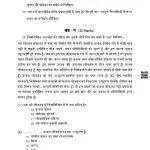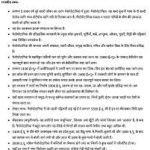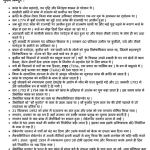Are you looking for class 12 political science chapter 2 notes in hindi ?
Lets explore the key topics and concepts covered in Chapter 2 of Class 12 Political Science, focusing on the simple explanations of essential topics. The aim is to provide easy-to-understand study materials, including lecture notes, textbook summaries, flashcards, and other helpful tools for exam preparation.
The chapter primarily deals with themes of political theory, fundamental rights, and the working of democracy in India.
Lecture Notes
The lecture notes for Chapter 2 of Class 12 Political Science focus on the evolution of the Indian political system. It provides an overview of how democracy functions in India and the significance of fundamental rights. The Indian Constitution guarantees these rights to all its citizens, ensuring equality and freedom. The political system is structured in such a way that every citizen can participate in the governance process.
Key points in lecture notes:
- Understanding the idea of democracy in India.
- Importance of fundamental rights.
- The role of the Constitution in shaping the political system.
- How the political framework supports diversity and pluralism.
Study Guides
The study guide helps you break down complex ideas into simpler components. For Chapter 2, the focus is on grasping the foundational concepts of the Indian political structure and the role of democracy. It also highlights how the Constitution has laid down rules for fair and equal treatment for all.
Study tips:
- Start by reading the textbook thoroughly.
- Take note of the key terms such as democracy, constitution, and rights.
- Review the examples given in the textbook to understand how democratic processes work in practice.
Textbook Summaries
This chapter of Political Science deals with democracy, its challenges, and the role of fundamental rights in the Indian political system. The Constitution of India guarantees several rights that are fundamental to protecting the dignity and freedom of individuals.
Main themes:
- What is democracy?
- The challenges of ensuring democratic governance.
- The protection of fundamental rights like freedom of speech, right to equality, and protection from discrimination.
Flashcards
Flashcards can help you memorize important terms and their definitions. Below are some of the essential terms from Chapter 2:
- Democracy: A system of government by the whole population, typically through elected representatives.
- Fundamental Rights: Basic rights guaranteed by the Constitution, including the right to equality, freedom of speech, and protection from discrimination.
- Constitution: The legal document that lays down the framework for the governance of a country.
Class Handouts
The class handouts for this chapter would cover:
- A brief outline of how democracy works in India.
- A list of fundamental rights provided by the Constitution.
- The structure of Indian political institutions such as Parliament, Judiciary, and Executive.
Research Notes
Research for Chapter 2 can be based on the comparison of Indian democracy with other democracies around the world. Analyzing the pros and cons of India’s political system can help deepen the understanding of how democracy functions uniquely in the Indian context.
Key areas for research:
- How does India’s democracy differ from other democracies?
- The role of fundamental rights in maintaining social harmony.
- Challenges to Indian democracy, such as political corruption and inequality.
Annotated Readings
While reading the textbook, it is helpful to highlight key sections and make notes in the margins. For Chapter 2, focus on:
- The historical background of democracy in India.
- Important legal cases that have shaped the interpretation of fundamental rights.
- The role of social movements in strengthening democracy.
Homework Solutions
Homework questions might revolve around the functioning of democracy and the role of fundamental rights in India. Here are example questions and solutions:
Question: What are fundamental rights?
Solution: Fundamental rights are a set of legal protections provided by the Constitution to all citizens, ensuring equality, freedom, and protection from discrimination.
Question: How does democracy work in India?
Solution: In India, democracy functions through a representative system where citizens elect their representatives to Parliament. These representatives make decisions on behalf of the people.
Exam Preparation Materials
For exams, focus on understanding the key principles of democracy, the role of fundamental rights, and how the Indian Constitution ensures equal participation for all citizens. Practice writing short essays on topics like “Challenges to Indian Democracy” and “The Importance of Fundamental Rights in India.”
Lab Reports
Although Political Science doesn’t include lab reports like science subjects, you can think of them as detailed reports on political case studies. One case study you can focus on is the evolution of fundamental rights through landmark court judgments in India.
Example:
- Case Study: The Kesavananda Bharati case, which discussed the extent of Parliament’s power to amend the Constitution, especially regarding fundamental rights.
Mind Maps
Mind maps are a great way to organize and visualize information. Here’s an idea for a mind map for Chapter 2:
- Central Concept: Democracy in India
- Branches: Fundamental Rights, Constitution, Political Institutions, Challenges to Democracy.
- Sub-branches: Right to Equality, Right to Freedom, Role of Parliament, Judicial Review.
Practice Quizzes
A practice quiz helps in testing your knowledge. Here are a few sample questions:
- What is democracy? a) Rule by the few b) Rule by the people c) Rule by the monarchAnswer: b) Rule by the people
- Which of the following is a fundamental right in India? a) Right to Property b) Right to Equality c) Right to WorkAnswer: b) Right to Equality
Sample Problems with Solutions
In Political Science, problems often take the form of essay questions or critical thinking exercises. Here’s an example:
- Problem: Explain how the Indian Constitution protects minority rights. Solution: The Indian Constitution provides for fundamental rights such as the Right to Equality, which ensures that all citizens, regardless of their religion, caste, or background, are treated equally under the law. Additionally, provisions such as reservations for Scheduled Castes and Scheduled Tribes help protect minority communities from discrimination.
Glossaries or Vocabulary Lists
Building a strong vocabulary is crucial for mastering Political Science. Here are some key terms from Chapter 2:
- Secularism: The principle of separating the government from religious institutions.
- Republic: A state in which power is held by the people and their elected representatives.
- Sovereignty: The authority of a state to govern itself.
By understanding these terms, you will get a clearer picture of how democracy functions in India and the role of citizens in this system.
Chapter 2 of Class 12 Political Science offers deep insights into the functioning of democracy and the protection of fundamental rights in India. By using a variety of study tools like lecture notes, flashcards, and practice quizzes, students can thoroughly grasp these concepts and excel in their exams.







